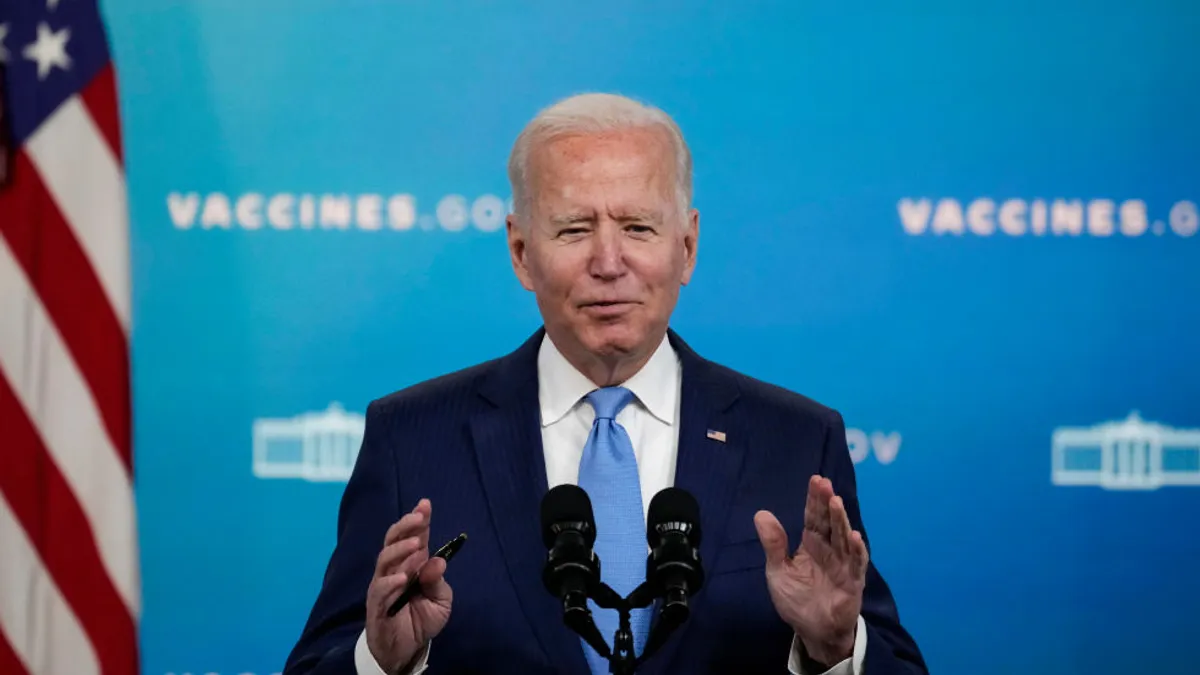Retail groups offered mostly cautious endorsements of President Joe Biden's latest effort to combat the pandemic, which in recent weeks has gained strength due to the delta variant of the coronavirus, by mandating immunization at large employers.
Warning that failure to inoculate an adequate percentage of the population would perpetuate the pandemic, further endanger lives and derail the economy, Biden on Thursday said that he's asked the Labor Department's Occupational Safety and Health Administration to develop a rule requiring companies with 100 or more employees "to ensure their workforce is fully vaccinated or require any workers who remain unvaccinated to produce a negative test result on at least a weekly basis before coming to work."
More than 200 million people in the U.S. have at least one shot, but the pace of immunization has slowed in recent weeks. Biden expressed exasperation with limits placed on vaccination by some governors and noted that a vaccine has been approved by the Federal Drug Administration, eliminating one reason some people say they've hesitated to get the shot. The government has made vaccines free and convenient in order to keep barriers low, he said.
"We've been patient," he said. "But our patience is wearing thin, and your refusal has cost all of us."
In a statement on Friday, National Retail Federation Vice President of Government Relations and Workforce Development Edwin Egee said the group would work with the Labor Department as it develops the rule. "We appreciate the administration's commitment to ensuring workplaces are safe despite the ongoing challenges of the pandemic," he said.
Retail Industry Leaders Association President Brian Dodge warned that "requiring large employers to mandate vaccination of all employees or produce a negative test is a colossal undertaking."
"Demonstrated good faith by employers to comply with the new rules should be appreciated and not punished," Dodge said in a statement.
Such a rule could exacerbate the labor shortage if anti-vaccine workers quit or companies try to stay under the 100-employee limit, and it will probably face legal fights, according to John Challenger, chief executive officer of outplacement firm Challenger, Gray & Christmas. By and large, however, the businesses affected by the rule will be relieved to be covered by a federal mandate rather than the hodgepodge of local and state rules that exists now, he said.
"Even with the inevitable challenges, this plan gives some guidance to HR teams and business leaders who for 18 months have been attempting to implement policy that is consistent with government regulations and makes sense for their organizations," Challenger said in emailed comments. "Ultimately, the plan's aim is to create a safe work environment for employees, which is a top priority for so many of the nation's business leaders."
An exodus of employees isn't likely, as not even a quarter would strongly consider leaving their jobs over a vaccine mandate, and 60% actually support one, according to research from Qualtrics. The process will be quite involved for employers, which have already been making work-from-home and other adjustments for the past 18 months, according to Qualtrics Chief Industry Advisor for Government Sydney Heimbrock, who previously worked in the U.S. Office of Personnel Management.
"The president's order means employers can stop discussing whether to impose a vaccination requirement, and begin the next important step of communicating with their employees about how they will act on it," Heimbrock said.
Not all industry groups were wary of the proposed rule; the American Apparel & Footwear Association applauded it. As demanding as it may be, the federal government's latest step will be crucial in the fight against a deadly disease that continues to set back the retail industry, AAFA CEO Steve Lamar said in a statement. The group also urged the U.S. to share excess vaccine supply with other countries.
"While the economy is doing better than it was last year, recent supply chain disruptions and factory closures due to the Delta variant have stymied our economic recovery," Lamar said. "These steps will go a long way to ensure that we are getting vaccines in arms, and that we can protect our workforce from this disease that has already cost the world so much."
























